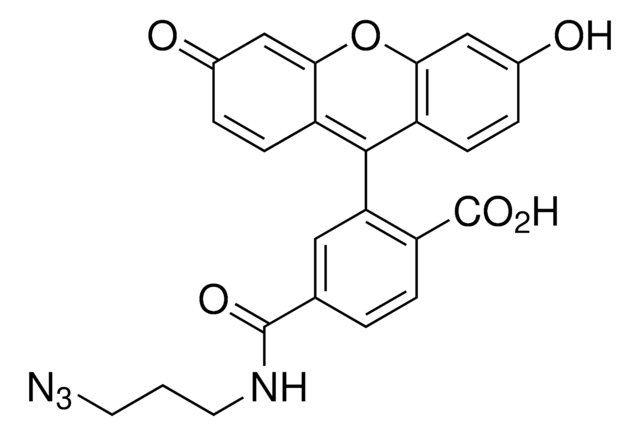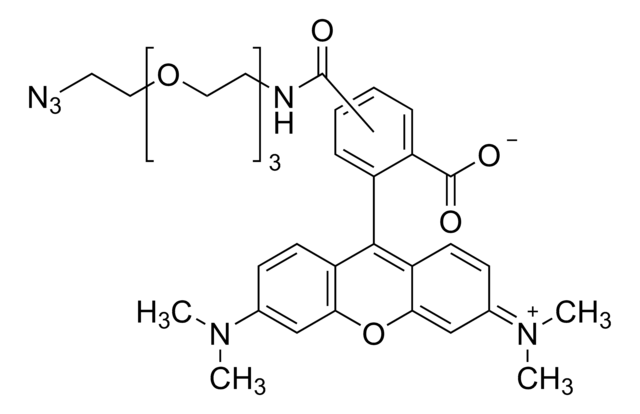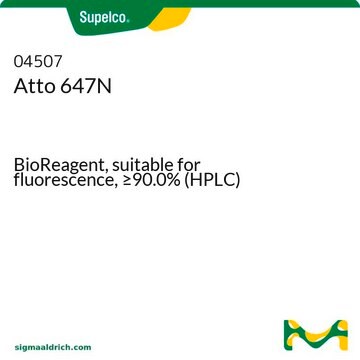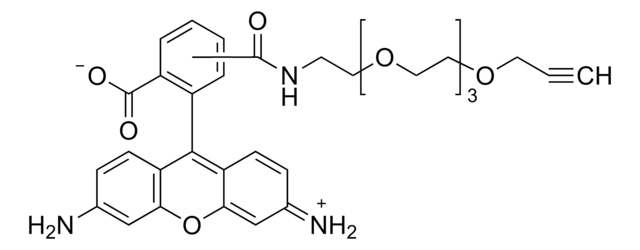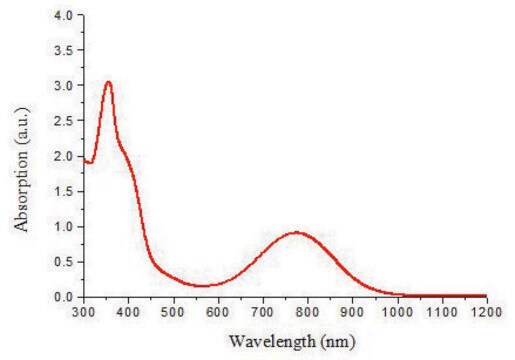91000
Atto 647N azide
BioReagent, suitable for fluorescence
Sign Into View Organizational & Contract Pricing
All Photos(1)
About This Item
UNSPSC Code:
12352125
NACRES:
NA.32
Recommended Products
product line
BioReagent
Quality Level
form
solid
mol wt
Mw 959 g/mol
manufacturer/tradename
ATTO-TEC GmbH
fluorescence
λex 644 nm; λem 661 nm
suitability
suitable for fluorescence
storage temp.
−20°C
General description
Atto 647N is a superior red-emitting label with high molecular absorption (150.000) and quantum yield (0.65) as well as sufficient stoke′s shift. Atto 647N is characterized by a high thermal and photostability. Absorption and fluorescence are independent of pH, at least in the most relevant range of pH 4 to 11. The azide modification is suitable for reactions with alkyne groups (Huisgen reaction - "Click Chemistry").
Storage Class Code
11 - Combustible Solids
WGK
WGK 3
Flash Point(F)
Not applicable
Flash Point(C)
Not applicable
Personal Protective Equipment
dust mask type N95 (US), Eyeshields, Gloves
Certificates of Analysis (COA)
Search for Certificates of Analysis (COA) by entering the products Lot/Batch Number. Lot and Batch Numbers can be found on a product’s label following the words ‘Lot’ or ‘Batch’.
Already Own This Product?
Find documentation for the products that you have recently purchased in the Document Library.
Customers Also Viewed
Feng Ye et al.
The Journal of endocrinology, 206(1), 27-36 (2010-04-16)
Adipose tissue is a highly active endocrine organ secreting a variety of signaling molecules called adipokines. Leptin and resistin are two adipokines critically involved in metabolic homeostasis. Nevertheless, the secretory pathways of these adipokines and their interplays are poorly elucidated.
Chunxiang Chen et al.
Sensors (Basel, Switzerland), 12(9), 11684-11696 (2012-11-01)
A novel lateral flow immunoassay (LFIA) signal amplification strategy for the detection of Cry1Ab based on amplification via a polylysine (PL) chain and biotin-streptavidin system (BSAS) is described. In this system, multiple fluorescence dyes (FL) were directly coated on the
Mengjun Xue et al.
Langmuir : the ACS journal of surfaces and colloids, 28(50), 17578-17584 (2012-11-24)
Mesoporous silica nanoparticles show promise as a drug-carrier vehicle for biomedical applications, but the development of simple, biocompatible capping systems has remained a challenge. We have found that lysozyme molecules can act as a pH-responsive nanovalve to block and unlock
Christian Eggeling et al.
Nature, 457(7233), 1159-1162 (2008-12-23)
Cholesterol-mediated lipid interactions are thought to have a functional role in many membrane-associated processes such as signalling events. Although several experiments indicate their existence, lipid nanodomains ('rafts') remain controversial owing to the lack of suitable detection techniques in living cells.
Single-molecule STED microscopy with photostable organic fluorophores.
Robert Kasper et al.
Small (Weinheim an der Bergstrasse, Germany), 6(13), 1379-1384 (2010-06-04)
Our team of scientists has experience in all areas of research including Life Science, Material Science, Chemical Synthesis, Chromatography, Analytical and many others.
Contact Technical Service